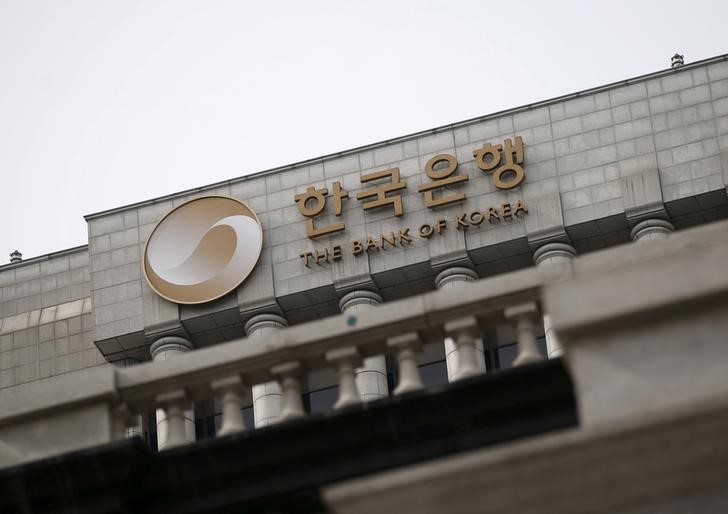By Cynthia Kim and Christine Kim
SEOUL (Reuters) - Bank of Korea Governor Lee Ju-yeol ran his term’s last monetary meeting on Tuesday, keeping interest rates on hold and talking up the health of South Korea’s economy but warning of the cost of U.S. protectionism to Korea’s car and steel industries.
Lee told a news conference that the Bank of Korea was not obliged to follow a global withdrawal of stimulus measures, further cementing a consensus view that the bank's monetary tightening will be gradual after its last hike to 1.50 percent in November.
The Federal Reserve's monetary policy committee meets on March 20 and 21, with markets focused on the prospect of another Fed rate rise following its December hike.
"South Korea's monetary policy is not decided automatically based on the monetary policy of the United States. Going forward, we will make our policy decisions comprehensively by looking at the economy, inflation and U.S. monetary policy," Lee said after the last rate decision before his term ends in March.
Lee reiterated that the risk of major capital outflows from South Korea wasn't significant, even if the U.S. policy rate were to rise above South Korea's.
"It seems Lee was being extra careful with his words, more so than other times because it was his last (rate decision event), out of concern that if he gives any clarity on future policy moves, it could limit policy room for the next governor," said Kang Seung-won, a fixed-income analyst at NH Investment & Securities.
The bank's decision to keep the seven-day repurchase rate
surveyed by Reuters.
Eight of the 14 economists surveyed expected the BOK to lift rates in May, with the others seeing a rise later.
Lee acknowledged the challenge from U.S. trade policies, saying South Korean industries that run the biggest trade surpluses with the United States would be hardest-hid by any stiffening of U.S. trade curbs.
"For example, I think we can say the auto and steel industries would be representative of that," Lee said.
The U.S. Commerce Department has recommended President Donald Trump impose steep curbs on steel imports, including those from South Korea, after slapping bigger taxes on washers and solar panels in January. There is also the risk a strong won could hurt South Korea's export competitiveness.
Lee said General Motors' plan to shut down one of its South Korean manufacturing plants did not warrant a change in the central bank's economic outlook.
"In the case of the GM factory shutdown in Gunsan, the factory operation rate is already very low and the impact of the shutdown on our economy overall will be limited. For the regional economy, however, the impact will be big."
UNCERTAINTIES FACE NEW BANK OF KOREA GOVERNOR
But such uncertainties underscore the challenge facing the BOK's new governor who should be nominated by President Moon Jae-in before Lee's term ends on March 31.
The new governor may soon be faced with prospect of raising interest rates without undermining growth or weakening consumption by households already saddled with record debt.
In November, the Bank of Korea raised the base rate by 25 basis points, its first tightening in six years. It sees the economy as likely to expand 3.0 percent this year, slowing slightly from last year's 3.1 percent.
The central bank said its board "anticipates that investment will slow, but that the trend of steady increase in consumption will continue, due in large part to improvements in household income conditions, and that exports will also sustain their favorable movements thanks to the buoyancy of the global economy".
Inflation eased to 1 percent in January, the slowest in 17 months, decelerating from December's 1.5 percent and undershooting the 1.3 percent seen in a Reuters poll of economists.
Such indicators have reinforced a broad consensus that the central bank's monetary tightening will be gradual this year as export- and investment-led growth moderates after 2017's rapid expansion.
